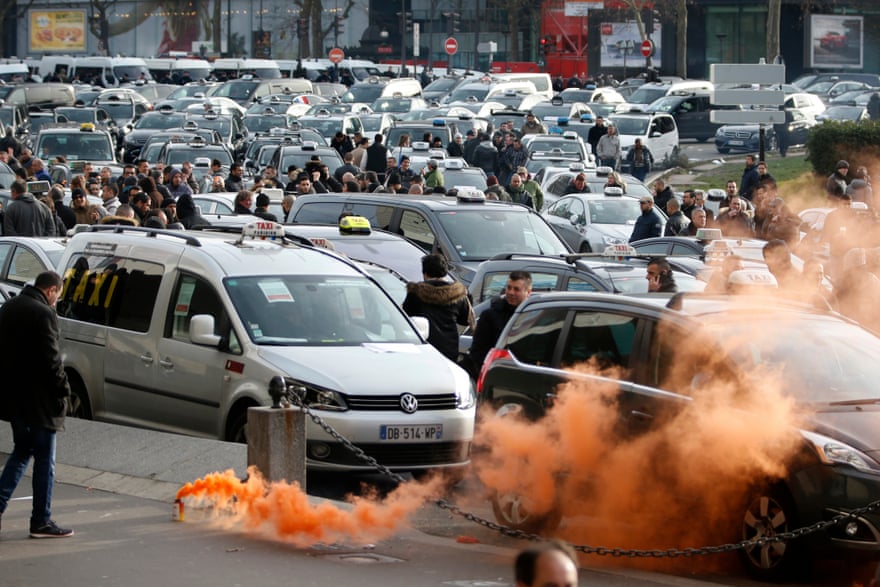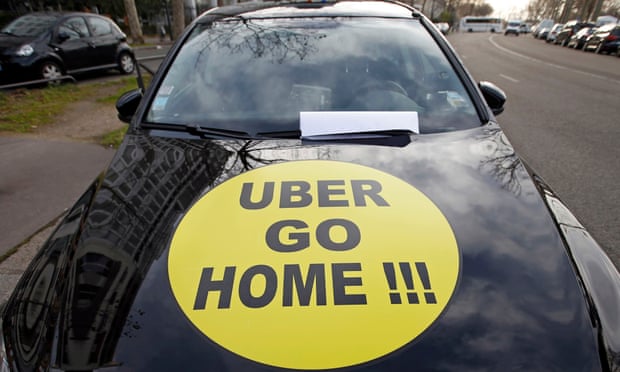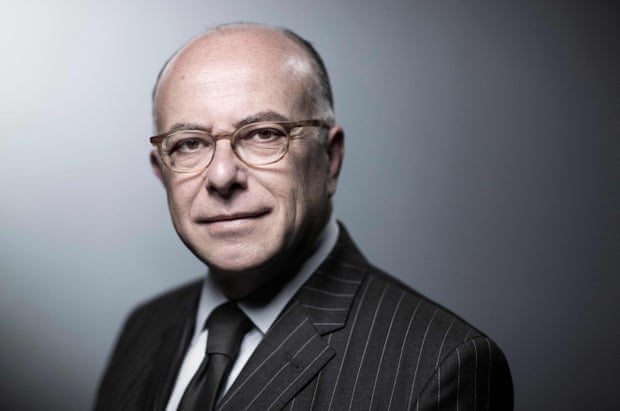[ad_1]
Emmanuel Macron went to extraordinary lengths to support Uber’s lobbying campaign to help it disrupt France’s closed-shop taxi industry, even telling the tech company he had brokered a secret “deal” with its opponents in the French cabinet.
Leaked files including text message exchanges between Uber executives and Macron reveal how the cab-hailing business identified him as a key ally when he was economy minister and turned to him to help it behind the scenes.
The files suggest pro-business Macron, who was re-elected French president in April, was close enough to Uber’s managers during his two years in the economy ministry from 2014-16 for them not to think twice about contacting him for possible help when their premises were raided by tax and other authorities.
The leaked records cover 40 countries and span 2013 to 2017, the period in which Uber was aggressively expanding across the world. They reveal how the company broke the law, duped police and regulators, exploited violence against drivers and secretly lobbied governments across the world.
To facilitate a global investigation in the public interest, the Guardian shared the data with 180 journalists in 29 countries via the International Consortium of Investigative Journalists (ICIJ). The investigation was managed and led by the Guardian with the ICIJ.
In a statement, Uber said: “We have not and will not make excuses for past behaviour that is clearly not in line with our present values. Instead, we ask the public to judge us by what we’ve done over the last five years and what we will do in the years to come.”
“,”credit”:””,”pillar”:5}”
Q&A
What are the Uber files?
Show
The Uber files is a global investigation based on a trove of 124,000 documents that were leaked to the Guardian. The data consist of emails, iMessages and WhatsApp exchanges between the Silicon Valley giant’s most senior executives, as well as memos, presentations, notebooks, briefing papers and invoices.
The leaked records cover 40 countries and span 2013 to 2017, the period in which Uber was aggressively expanding across the world. They reveal how the company broke the law, duped police and regulators, exploited violence against drivers and secretly lobbied governments across the world.
To facilitate a global investigation in the public interest, the Guardian shared the data with 180 journalists in 29 countries via the International Consortium of Investigative Journalists (ICIJ). The investigation was managed and led by the Guardian with the ICIJ.
In a statement, Uber said: “We have not and will not make excuses for past behaviour that is clearly not in line with our present values. Instead, we ask the public to judge us by what we’ve done over the last five years and what we will do in the years to come.”
But most remarkably, the then 37-year-old ex-Rothschild banker told Uber he had cut a deal favourable to Uber with a bitterly divided Socialist government. It appears to have involved the Silicon Valley company closing down its most controversial unlicensed service in exchange for significantly lighter rules for another.
The messages paint a portrait of a politician who was, at least initially, exceptionally accommodating to Uber. “Thanks dear Travis,” the economy, industry and digital affairs minister wrote to the company’s co-founder Travis Kalanick in one late 2014 email exchange. “Let us keep in touch and progress together. Best, Emmanuel.”
The future president was seemingly shy about recording his in-person meetings with Kalanick in his public diary: of four revealed by the leak, only one, in Davos in January 2016, seems ever to have been made public. Behind the scenes, however, files suggest he and his aides were doing what they could to make life easier for Uber in France.
The ‘startup nation’
The story of Uber in France is of a brash US startup playing hardball in the heart of old Europe; of protests, police crackdowns, and beaten-up drivers; of digital dirty tricks, executive arrests, inflatable dolls and F-words from Courtney Love. The remarkable role played by Macron, a young and ambitious minister bent on revolution, has until now gone untold.

Uber’s presence was always going to cause problems in a country that takes workers’ rights as seriously, and defends them as robustly, as France. For many, including in government, Uber’s model was simply anathema, synonymous with wholesale job insecurity and the casualisation of labour.
Besides political and legal opposition, the company’s drivers faced the physical fury of France’s licensed cab drivers, themselves labouring under a regulatory regime that included up to 300 hours of obligatory training and a limited – and insufficient – quota of taxi licences that in some cities changed hands for up to €250,000.
The ensuing clash marked France deeply enough for the Larousse dictionary to add, in 2017, the word ubérisation to its lexicon: “The challenging of an economic model by a new player offering the same services at lower prices, carried out by self-employed persons rather than employees, most often via internet reservation platforms.”
Macron’s early enthusiasm for Uber and what he felt it represented was absolute. Appointed in August 2014, he made no secret of his ambition to both embrace the new digital economy and shake up France’s rigid labour market in an effort to reverse rising unemployment, especially where it was highest – among poorly qualified young men from immigrant backgrounds. He wanted a “startup nation”, and Uber could showcase it.
Macron wanted Uber to show France the potential of the new, deregulated economy; his job, he insisted, was to help “the outsiders, the innovators”. Banning Uber, he would tell Mediapart, would have been tantamount to sending unemployed youths from the run-down banlieues “back there to sell drugs”.
Files show Macron welcomed the company’s input. Before an initial meeting between Uber and Macron, a ministerial aide wrote to its French management asking explicitly for its “regulatory expectations”, as well as the estimated impact of its business on employment and transport costs.
That meeting, when it eventually took place on 1 October 2014 at the finance ministry, set the tone for the rest, unfolding in a “remarkably warm, friendly and constructive” atmosphere, according to an internal Uber note. Macron wanted to “find ways to make France work for Uber, so Uber can work in and ‘for’ France”, it added.
The note suggests the minister was “apologetic” about a law introduced by the Socialist assembly member Thomas Thévenoud that had been adopted only that morning. It radically restricted the activities of VTCs, as app-based ride-hailing services in France are known (the initialism stands for véhicule de tourisme avec chauffeur).
Macron showed a “clear desire to work around the [new] Thévenoud legislation”, according to Uber’s note of the meeting.
The company’s chief lobbyist in Europe, Mark MacGann, was delighted. “Spectacular meeting, never saw anything like it,” he wrote. “We’ll all be dancing soon.” Kalanick, too, was happy, thanking Macron personally – albeit with a caveat.
“I take very seriously your comment that you believe ‘Uber brings innovation and jobs to France’,” he wrote. “I make the commitment to you that we will do just that, and at a rapid pace, if the appropriate regulatory framework can be found to make Uber a success in France.”

The document trove shows this would be the first of almost 50 phone calls, email exchanges or face-to-face meetings between the young economy minister or his staff and senior Uber executives. And for good reason: the app-based service was finding the going in France far from easy.
A key bone of contention was Uber’s “person-to-person” UberPop service, which allowed private individuals to offer rides in their own cars. For Uber, this was car-sharing; for France’s authorities it was an unregulated commercial transport service, banned under the new Thévenoud law and by local government decrees.
It was UberPop that prompted the most violent scenes in France’s taxi wars. The US musician Courtney Love got caught up in one skirmish in June 2015. “Where are the fucking police???” the widow of Nirvana’s Kurt Cobain tweeted at the then president, François Hollande. “Is it legal for your people to attack visitors? Get your ass to the airport. Wtf???”
Taxi drivers had “ambushed our car and are holding our driver hostage”, Love wrote, adding a photo of an egg-splattered vehicle. “They’re beating the cars with metal bats. This is France?? I’m safer in Baghdad.”
‘Sorry to bother you, but there’s a raid happening’
France’s justice ministry, tax authorities and assorted other regulatory bodies all took a very close interest in Uber’s activities, raiding the company’s offices in Paris, Lille and Lyon at least five times between late 2014 and mid-2015.
Politically, the situation was no easier. At the interior ministry – legally responsible for France’s regular licensed taxis – the home affairs minister, Bernard Cazeneuve, disliked what he viewed as a cowboy outfit operating on the fringes of the law; the prime minister, Manuel Valls, was only slightly less opposed.

While the files show Uber executives identified Macron as an ally, they marked Valls down early on as a “strong-minded” opponent, privately denouncing him as “enemy #1” and plotting demonstrations against him – including the surreal suggestion from one senior executive of “lots of drivers with Valls mask on and a guillotine”.
Uber discussed – and often tried – everything from “civil disobedience” to social media campaigns and relentless court challenges. Some suggestions outlined in the files were absurd: at one stage, a senior executive proposed placing inflatable dolls in cars to get round a ban on one class of driver carrying fewer than two passengers. An Uber spokesperson said the suggestion was among “a long list of brainstormed ideas” and was not implemented.
But if the company allowed Macron to present himself as France’s innovator-in-chief, what did it get in return?
One of the regulatory bodies investigating Uber was France’s grandly named directorate general…
[ad_2]
Read More: Emmanuel Macron secretly aided Uber lobbying drive in France, leak reveals
